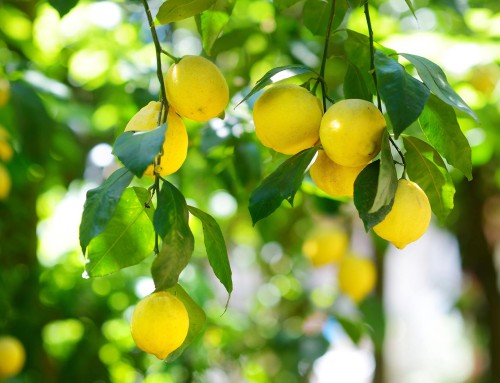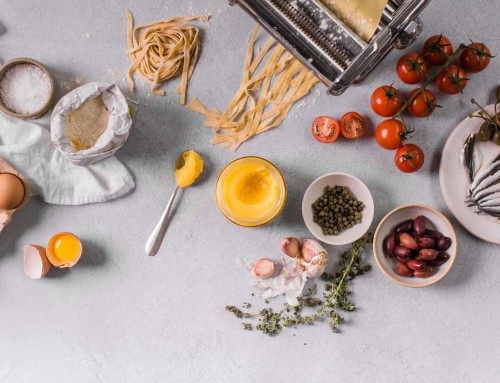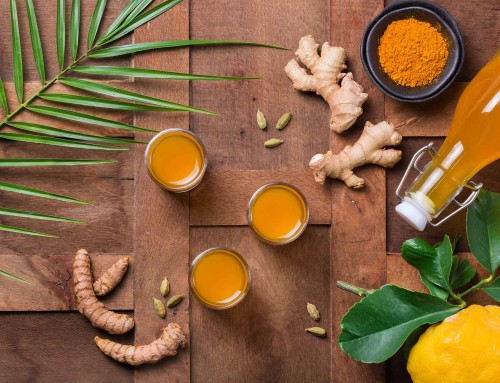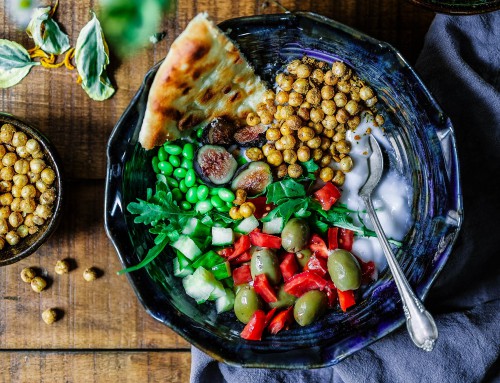
January heralds the start of the Kapha season, and its cold, dull, damp and heavy weather tends to increase Kapha within the body. We often think of winter as a time for Kapha-associated diseases, such as colds and flu, yet Ayurveda maintains that winter is not weakening but strengthening, and the best season to improve your immunity.
Bala is the term Ayurveda uses for immunity and general strength, whether it be physiological, psychological or spiritual. As each of these aspects of ourselves are intimately connected, a disturbance in any area will affect your overall health and immunity. By increasing Bala you will automatically improve your natural resistance against disturbance in any area of your life.
The three levels of Bala
Ayurveda cites three levels of Bala immunity and strength:
- Sahaj (hereditary) is the innate level of Bala you are born with
- Kalaj (changable) is the Bala that fluctuates due to seasonal changes, different stages of life, and cycles of the planets. Here we need to look to the cycles of nature as a guideline for maintaining immunity
- Yuktikrit (established) is the permanent, balanced immunity that can be created by following an balanced lifestyle and diet.
Tips to increase and maintain your Bala
1. Eat well during the cold season
When the weather is cold, your internal homeostatic system compensates by increasing internal Agni or heat. This means that your digestive fire and appetite is generally stronger during winter. Thus, if you eat fresh, wholesome food, this is the season where your body tissues, and thereby overall strength and immunity, can be built up.
A major reason why winter is often seen as a time for low immunity, where colds and flu abound, is that, with all the socialising during the festive season, we can end up eating too much or eat junk foods or hard-to-digest, heavy foods. Our immunity is thereby weakened.
Eat immunity-increasing freshly cooked foods during the cold weather, and follow an Ayurvedic daily routine – nourish your mind and body by eating well and getting more rest.
 2. Winter is the best season to take Rasayanas
2. Winter is the best season to take Rasayanas
While autumn and spring are the traditional times for purification, winter is the time to build up and nourish the whole physiology, from the internal organs and tissues, to the skin, hair and nails. It’s also the best time to take Rasayanas (rejuvenating preparations) and other Ayurvedic herbal products – because your digestive fire is naturally higher, your ability to assimilate the herbals and enjoy their benefits is boosted.
3. Eat immunity-boosting foods
Go for organic, fresh, easily digested, wholesome and unprocessed foods. These include fresh, organic milk and yogurt (though yogurt should be diluted with water and only drunk at lunch), fruits, nuts, vegetables, whole grains, lentils, beans, and ghee.
4. Avoid hard-to-digest foods
Processed, canned, frozen, and packaged foods have little Prana (life-force) left in them, and easily create Ama (toxins) in your body tissues. One example is that pre-prepared foods – when stored for any length of time – tend to oxidise and, when eaten, create free-radicals.
Avoid eating leftovers, foods grown using chemicals, and foods with preservatives, as they over-tax your digestive system, block the channels of circulation, create sluggishness and compromise immunity.
Avoid cold foods and iced drinks, as these weaken digestive fire.
5. Change your winter diet for the Kapha season
During the cold, dry, autumn and early winter Vata-increasing period, sweet, sour and salty tastes foods help nourish and balance your body, and you are recommended to eat less astringent, bitter, and pungent foods.
When the Kapha season starts (in Europe this is generally in January), the astringent, bitter, and pungent tastes are recommended, as they prevent the over-accumulation of Kapha. The light, dry, heating and penetrating qualities of such foods balance the heavy, wet, cold and sticky qualities of Kapha.
Of course, your own doshic body-type will also come into play and you must be careful to keep this factor well-balanced at the same time. Those who have more Vata in their constitution need to be cautious when increasing astringent, bitter, and pungent foods. Pitta body-types should be careful when increasing astringent and pungent foods.
6. Keep up your Ayurvedic routine
A poor routine will have a strongly negative impact on your Bala strength and immunity. Eating at irregular times, subjecting your body to stress and fatigue, working at night, staying up late, and sleeping during the day can all affect both your body rhythms and your digestion and ultimately compromise your immune system.
To maintain high immunity, keep your digestive clock, and other bodily rhythms, working smoothly and follow a balanced daily routine.
 7. Take advantage of the natural tendency to rest
7. Take advantage of the natural tendency to rest
Winter is an inward season. The days are shorter, the nights longer and nature is at rest. Take advantage of this natural tendency by giving your mind and body the nourishing rest it craves. Go to bed a little earlier, and you will wake up feeling more freshness and vitality.
Yet, when the Kapha influence becomes prominent, from late winter onwards, take care not overindulge and sleep late or else dullness and lethargy will result, and toxic Ama (the seeds of disease) will accumulate.
8. Lifestyle tips to balance Kapha
From January onwards, have in mind to balance the increasing influence of Kapha. The best way is to cultivate the opposite qualities of the heavy, dull, stay-at-home qualities of Kapha:
- Get out and be more dynamic and active
- A daily brisk walk in the fresh air is an excellent routine, especially during Kapha season – though make sure you wrap up well
- Look out for new activities and interests, and for things that will stimulate and bring joy
- Get up early (before 6am) and avoid sleeping in.
9. Spice-up your immunity
Spices not only provide wonderful flavours to a meal, but also provide certain therapeutic values, such as anti-bacterial and anti-viral properties.
Spices, such as ginger, black pepper, turmeric, cumin, coriander and cinnamon, also help to provide the astringent, bitter, and pungent tastes that help balance Kapha. Maharishi AyurVeda provide Kapha Tea and Kapha Churna (spice blend), that contain spices and herbs that help balance Kapha.
 You can create your own immunity-boosting spice mix:
You can create your own immunity-boosting spice mix:
Ingredients
- 6 parts fennel powder
- 6 parts turmeric powder
- 3 parts coriander powder
- 3 parts cumin powder
- 1 part black pepper powder
- 1 part ginger powder
- ¼ part cinnamon powder
Directions
- Mix all the ingredient together in a bowl and store in an airtight container, away from direct sunlight
- When adding to a meal, sauté some of the spice mix in a teaspoon of ghee or coconut oil. When you smell the spicy aroma, immediately remove the pan from the heat to prevent burning
- You can stir in the spice mix to a pan of cooked dhal, vegetables or grains (don’t add the mix to every dish in your meal, or else everything will taste the same!)
- Try stirring steamed vegetables into the spice mix while it is still in the pan
- You can add the spice mix at the beginning of cooking vegetable soups or stews
- Try sprinkling the sautéd spice mix on top of vegetables or grains before serving
- If you go out for a meal, you can take some of the sautéd spice mix and sprinkle it onto your food.
10. Take Maharishi AyurVeda supplements to strengthen Bala
 Maharishi Amrit Kalash is the most powerful ayurvedic supplement for supporting immunity and overall well-being.
Maharishi Amrit Kalash is the most powerful ayurvedic supplement for supporting immunity and overall well-being.
Produced in 250 meticulous steps, using numerous ingredients, the functions of the different herbs in Amrit Kalash are important. There are Hridya herbs for the heart; Medhya herbs for the mind and nervous system; herbs that balance all three Doshas, such as Amla; and nurturing herbs such as Ashwagandha which helps nourish all seven body tissues, particularly the reproductive tissue, and Shatavari which helps increase the production of Ojas (the highest product of good digestion and very supportive of immunity).
Cold Season Defence supports your immunity before symptoms appear. It strengthens digestion, clears the Shrotas (channels that supply nutrition), removes toxins, supports the immune system and helps prevent viral attacks.
When colds and flu are around Sniffle Free Tea supports your body’s defences by strengthening your digestion and supporting the balance of mucus and moisture in your sinuses and lungs.
11. Give yourself an oil massage
Daily Abhyanga (Ayurvedic massage) is a pleasurable way to support your immunity. Massage helps stimulate all organs of your body; it helps flush away impurities; and it builds up resistance to stress and disease.
You can choose from Vata Massage Oil (moisturising), Pitta Massage Oil (soothing), and Kapha Massage Oil (stimulating).
 12. Try apple and cloves at breakfast
12. Try apple and cloves at breakfast
Try starting the day with a stewed apple. It will help build a good appetite for lunch, encourage regular bowel movements, increase alertness and vitality, and provide a light and satisfying start to the day.
Ingredients
- 1 large or 2 small sweet apples
- 5 cloves
- 1/4 cup of water
Directions
- Core and peel the apple
- Cut the apple into small pieces
- Put the cloves, apples and water in a pot
- Bring to the boil, turn the temperature down to simmer and cover
- Cook until the apple is soft
- Remove the cloves and enjoy your breakfast.





